Product Detail
Product NameCDH16 Rabbit Polyclonal Antibody
Host SpeciesRabbit
ClonalityPolyclonal
IsotypeIgG
PurificationAffinity purification
ApplicationsWB,IHC,IF
Species ReactivityHuman,Mouse,Rat
Immunogen DescRecombinant fusion protein of human CDH16 (NP_004053.1).
ConjugateUnconjugated
Other NamesCDH16
Accession NoSwiss Prot:O75309
GeneID:1014
Uniprot
O75309
Calculated MW79kDa/85kDa/87kDa/89kDa
Sdspage MW110kDa
FormulationBuffer: PBS with 0.02% sodium azide,50% glycerol,pH7.3.
StorageStore at -20˚C. Avoid freeze / thaw cycles.
Application Details
WB 1:500 - 1:2000
IHC 1:50 - 1:100
IF 1:50 - 1:100
Western blot analysis of extracts of various cell lines, using CDH16 at 1:1000 dilution.
Immunohistochemistry of paraffin-embedded rat brain using CDH16 at dilution of 1:100 (40x lens).
Immunohistochemistry of paraffin-embedded rat kidney using CDH16 at dilution of 1:100 (40x lens).
Immunohistochemistry of paraffin-embedded rat heart using CDH16 at dilution of 1:100 (40x lens).
Immunohistochemistry of paraffin-embedded mouse brain using CDH16 at dilution of 1:100 (40x lens).
Immunohistochemistry of paraffin-embedded mouse kidney using CDH16 at dilution of 1:100 (40x lens).
Immunofluorescence analysis of rat kidney using CDH16 Polyclonal at dilution of 1:100 (40x lens). Blue: DAPI for nuclear staining.
This gene is a member of the cadherin superfamily, genes encoding calcium-dependent, membrane-associated glycoproteins. Mapped to a previously identified cluster of cadherin genes on chromosome 16q22.1, the gene localizes with superfamily members CDH1, CDH3, CDH5, CDH8 and CDH11. The protein consists of an extracellular domain containing 6 cadherin domains, a transmembrane region and a truncated cytoplasmic domain but lacks the prosequence and tripeptide HAV adhesion recognition sequence typical of most classical cadherins. Expression is exclusively in kidney, where the protein functions as the principal mediator of homotypic cellular recognition, playing a role in the morphogenic direction of tissue development. Alternatively spliced transcript variants encoding distinct isoforms have been identified.
If you have published an article using product 55359, please notify us so that we can cite your literature.


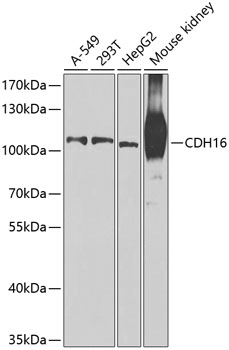
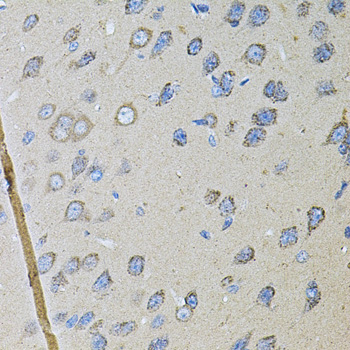
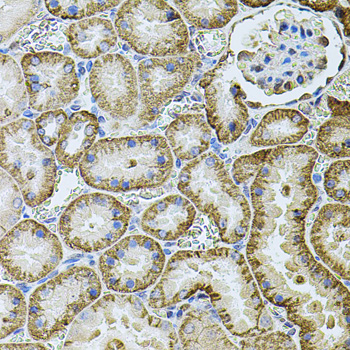

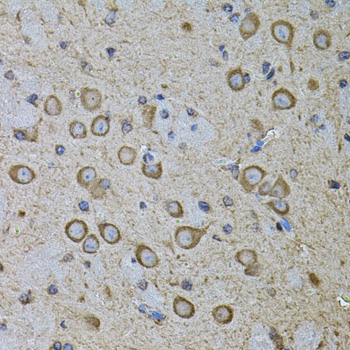
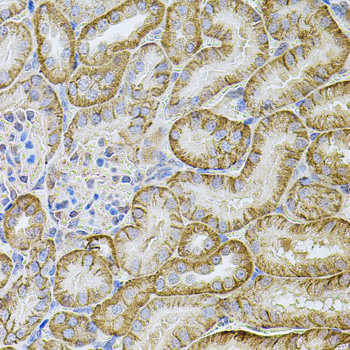
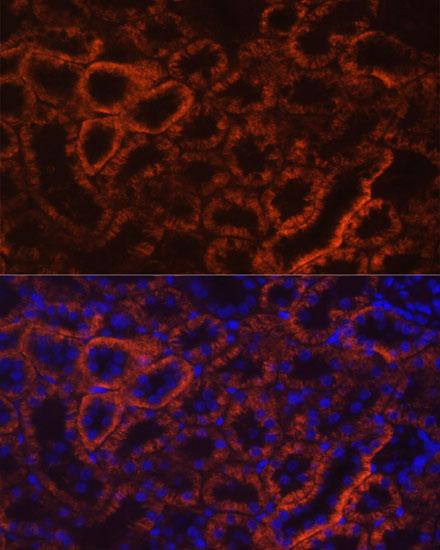
 Yes
Yes



